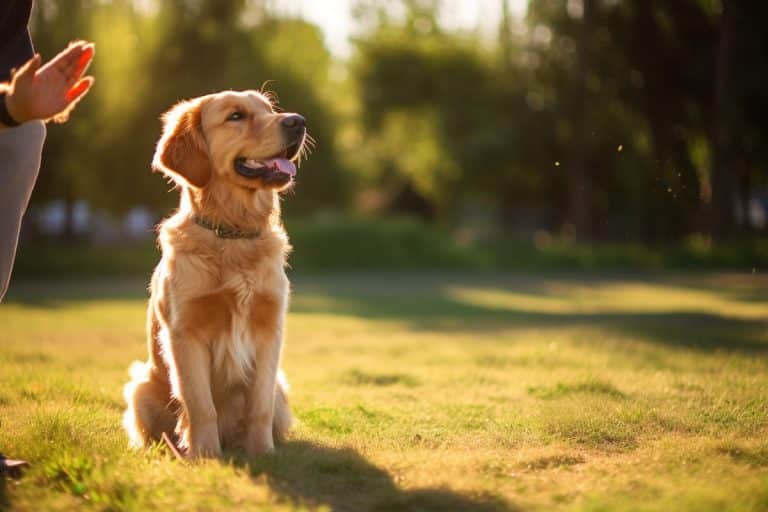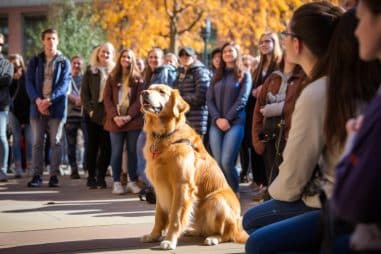So, you’re thinking about bringing a Golden Retriever into your life, and you’re wondering how easy it will be to train this lovable breed. You’re not alone; many future dog owners have this question at the top of their list. Golden Retrievers are popular pets for a reason—they’re friendly, playful, and yes, pretty smart too. But being smart doesn’t automatically make a dog easy to train.
This article will dig into just how trainable Golden Retrievers are. You’ll learn about their intelligence, how to potty train them, and even some advanced training tips. Every dog is unique, but certain traits are common among Golden Retrievers that can make training easier or more challenging.
Are Golden Retrievers Smart?
You might have heard that Golden Retrievers are one of the smartest dog breeds, and you’ve heard right! Golden Retrievers are incredibly quick learners. These smart dogs can grasp basic commands within a short period and are even good at understanding human emotions. They’re often used as service dogs or in roles that require intelligence, like search and rescue.
There have been doggy IQ tests that measure a pup’s intelligence, and Golden Retrievers usually rank pretty high. They can solve problems, figure out new tasks, and even remember things for years. This intelligence often makes them easier to train, as they can quickly understand what you’re asking of them.
Experts in the field of dog behavior and training often sing praises about how trainable Golden Retrievers are, largely because of their high intelligence. But remember, a smart dog can also get bored easily, so keeping training sessions engaging is key.
The Importance of Early Training
Just like kids, dogs also need to start learning from an early age. The first few months of a Golden Retriever’s life are like a sponge for knowledge. Training your Golden Retriever pup early is an investment that will pay off for years to come.
Around 7 to 16 weeks old is an excellent time to start basic training and socializing. Socialization means getting your pup used to different people, animals, and environments. This early exposure helps them grow up to be well-rounded dogs.
Consistency is also super important. If you teach your Golden Retriever a command, make sure you use the same words and gestures each time. Changing things up can confuse them. So, sticking to a routine helps a lot.
Is a Golden Retriever Easy to Potty Train?
Potty training: the hurdle almost every pet parent has to jump. Luckily, Golden Retrievers are generally easy to potty train, especially if you start young. Around the 8- to 12-week mark is a good time to start.
To make it easier, pick a specific spot in the yard for bathroom breaks. Each time your pup needs to go, take them to that spot. They’ll start to associate that area with going to the bathroom.
Some folks recommend using a crate for potty training. Pups usually don’t like to soil where they sleep, so a crate can help set boundaries. Just make sure it’s spacious enough for them to move but not too big; otherwise, they might just use a corner as their bathroom. A crate around 91 to 106 cm (36 to 42 inches) is usually suitable.
If you run into any issues, don’t worry too much. Some Golden Retrievers might take a little longer to get the hang of it. Consistency and patience are key.
How to Train Golden Retrievers
So you’ve decided to add a Golden Retriever to your family, and now you’re eager to dive into the training process. You’ve made a great choice—Golden Retrievers are not only loving companions but also highly trainable dogs.
The Importance of Consistency
Before diving into specific training tips, it’s important to talk about being consistent. Consistency is key when training any dog, but especially a Golden Retriever. These dogs are keen observers, and they pick up on your habits. Make sure you use the same words, tone, and actions when you’re training. This helps your dog understand what you expect and makes it easier for them to follow your commands.
Basic Commands for Golden Retrievers
Let’s start with the basics. Basic commands like “Sit,” “Stay,” and “Come” are important for your dog’s safety and well-being. Start by choosing a quiet place to train, where there are few distractions. Use treats or a favorite toy as a reward. Say the command clearly, and when your dog performs the action, reward them instantly. If your dog doesn’t follow through, don’t scold them. Just try again.
It’s crucial to keep training sessions short but frequent. For puppies, sessions should last about 5-10 minutes, whereas for adults, you can go up to 15-20 minutes. A couple of sessions each day can make a big difference.
Advanced Training Techniques
Once your Golden Retriever has mastered the basics, you can start venturing into advanced training. This could involve learning more complex commands like “Roll over,” “Fetch,” or even navigating an agility course. These exercises keep your dog mentally stimulated, which is vital for a breed as intelligent as the Golden Retriever.
Positive reinforcement is still the most effective training method for these dogs. Keep rewarding them for their good behavior, and you’ll likely see fast results.
Socialization
Golden Retrievers are generally friendly and social, but they can benefit from intentional socialization. Take your dog to different environments—parks, beaches, and pet-friendly stores can be great places to start. Introduce them to different people and animals, always ensuring that the experience is positive for everyone involved. Socialized dogs are generally happier and less likely to show signs of aggression or fear in new situations.
Using Training Tools
Training tools like clickers or treat pouches can be very useful in reinforcing good behavior. A clicker makes a distinct sound that lets your dog know they’ve done something right. A treat pouch keeps your hands free and makes it easier to quickly reward your dog during training sessions. These tools aren’t essential, but many dog owners find them helpful.
How to Train a Golden Retriever Puppy
Alright, you’ve got a Golden Retriever puppy and you’re ready to dive into training. Good news, they’re usually eager to learn! Start with basic commands like “Sit,” “Stay,” and “Come.” These commands lay the foundation for future training.
Positive reinforcement works wonders with Golden Retrievers. Whenever they follow a command, give them a treat or shower them with praise. They love to make you happy, so showing them that they’ve done a good job will make them more likely to repeat that behavior.
Training sessions for puppies should be short but frequent. Just like human kids, puppies have short attention spans. Aim for sessions that are about 5 to 10 minutes long, a few times a day.
You might want to use training tools like clickers or treat pouches. They aren’t necessary but can be helpful. A clicker can make a sound that lets your pup know they’ve done something right, and a treat pouch can make it easier to reward them quickly.
Training Challenges and Solutions
Golden Retrievers are often touted as one of the easiest breeds to train. They’re smart, eager to please, and generally adaptable. But let’s be real—even the most trainable dogs come with their own set of challenges. Luckily, most of these can be overcome with the right approach.
Boredom and Lack of Mental Stimulation
The Challenge
Golden Retrievers are intelligent dogs. While this makes them quick learners, it also means they get bored easily. A bored Golden Retriever can be a destructive one, digging up your garden or chewing on your favorite shoes.
The Solution
To keep your Golden Retriever mentally stimulated, you should incorporate a variety of training exercises. Think beyond basic commands and engage in activities that require problem-solving. Interactive toys and puzzle feeders are also great for keeping your dog mentally engaged. Try to vary the activities to prevent boredom and maintain interest.
Over-Excitability and High Energy Levels
The Challenge
Golden Retrievers are energetic dogs, and sometimes their excitement can get in the way of training. An over-excited dog is less likely to focus and follow commands, making the training process frustrating for both of you.
The Solution
Physical exercise is key to managing high energy levels. Before you begin a training session, allow your dog to burn off some energy. A game of fetch or a 20-minute walk can work wonders. Keep training sessions short and fun to match your dog’s attention span.
Leash Pulling
The Challenge
Many Golden Retrievers love to explore, sniff, and discover new things, leading them to pull on the leash during walks. This not only makes walking unpleasant but can also be dangerous.
The Solution
Start leash training in a controlled environment like your backyard. Use a sturdy, fixed-length leash about 1.2 meters (about 4 feet) long. Every time your dog pulls, stop walking. Only continue when the leash slackens. Reward good behavior with treats or verbal praise.
Stubbornness or Selective Hearing
The Challenge
Sometimes, it seems like your Golden Retriever has developed “selective hearing,” choosing to ignore your commands. While they’re generally eager to please, they do have an independent streak at times.
The Solution
Consistency is crucial here. Make sure everyone in your household is using the same commands and rewards system. If your dog doesn’t respond at first, don’t repeat the command multiple times, as this teaches them that they can ignore you. A short time-out can help refocus their attention.
Over-Friendliness
The Challenge
Golden Retrievers are known for their friendly disposition, but sometimes their enthusiasm for making new friends can interfere with training, especially during walks or socialization exercises.
The Solution
Socialization is the best way to temper over-friendliness. The more experiences your dog has with other people and dogs, the less overly excited they’ll be during new encounters. Train your dog to sit and stay when meeting new people or pets, rewarding them for calm behavior
Conclusion
Training a Golden Retriever can be a joyous and rewarding journey. They’re smart dogs that usually aim to please, which often makes them relatively easy to train. Whether you’re starting with a puppy or an adult dog, remember that consistent, positive reinforcement is the way to go. Training isn’t just about teaching commands; it’s about building a strong, happy relationship with your pet. So go ahead and make the most of this special time. Your efforts will be rewarded with a well-behaved, loving companion.








